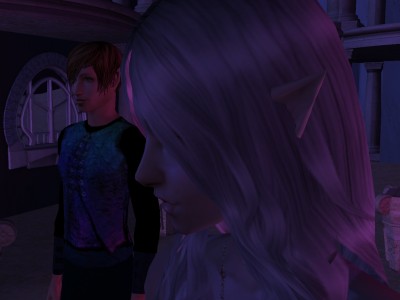
“Where have you been, Vash?”
Vash stood as stiffly as one of the pillars supporting the walls. “May the waters wash you clean of sorrow, Nimea.”
“And you, Vash. Where have you been?”
“Don’t you know?” he sniffed. “Surely you knew I wasn’t coming those nights. You who see everything?”
Nimea laughed softly and turned to him. “No. I do not see everything. You remain a great mystery to me, for example. I cannot see into your heart.”

“How poetic of you.”
“I did not know why you no longer came to see me. I feared I had said something to offend you.”
Vash took a step away from her as she moved closer. “We had said that when the elf Iylaina was grown and I took her to me, I would no longer come here. She is not mine, but she is grown, and so I decided to stop coming. I do not know why I bothered to come tonight,” he muttered.
Silently he cursed himself for doing it. It already seemed a mistake.
“But, Vash…”
She turned and strolled away from him, and he followed. He was always so easily led when he was hoping to hear of Iylaina, and he despised himself for it – not for loving Iylaina, but for making it be a leash in the Bright Lady’s hands.

She sighed and shook her head. “I told you that then, because I thought you would prefer to spend your nights with your wife rather than with a cold and lonely creature such as I. But since you cannot…”
“A cold and lonely creature unto me,” he sneered. “Am I supposed to pity you, Nimea?”

“You might. You want me to pity you.”
“Don’t you? Can’t you?”
“I do. How many springs have passed you by, Vash?”
“Twenty-two winters have passed me by.”
“How many springs?”
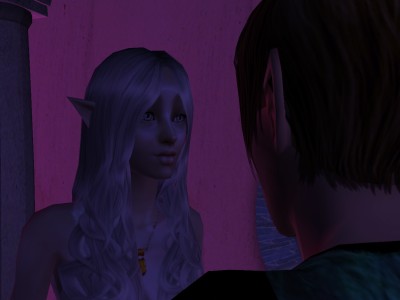
Vash hesitated. This was not how they reckoned time. “Twenty-three, I suppose.”
“You are young. When one is young and one suffers because one is alone, one imagines that one alone suffers. Else you would pity me.”
“You?” he laughed bitterly. “With all I have lost while you stood by? My mother, my wife, my dearest friend, my son I should have had! All the future of my people!”

“Me. How many springs will you pass by, Vash? Eighty? One hundred?”
“Fewer, I hope.”
“I am old past all reckoning, and I shall never die. Think of that. Not since your grandfather’s grandfather’s grandfather have I had another guest in my hall. I suffer because I am alone, and I am alone in my suffering. Think of that.”
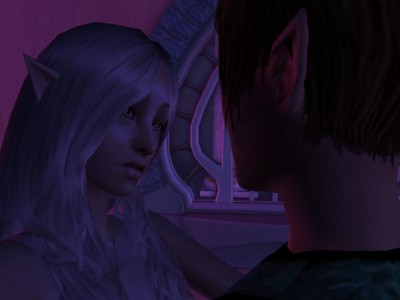
She laid a hand on his shoulder, and even through his shirt he could feel that her hands were cold like water.
“Two hundred lonely springs passed me by before you came to me, and I see you one night out of every twenty-nine, and several moons have passed since I saw you last. Think of that.”
“And I think you will not see me again, though eighty or one hundred springs pass you by. Think of that.”
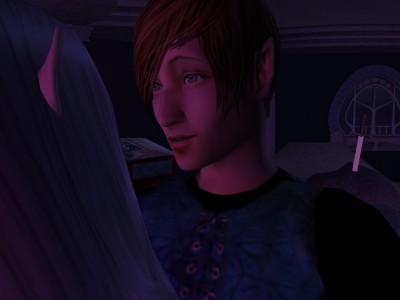
Vash laid a hand on her bare arm.
She had always repulsed him. Her beauty was otherworldly, with her white eyes and her long ears – the antithesis of what passed for feminine beauty among his people. But worst of all was the chill of her body. She was as cold as the amphibious creatures living at the lake’s edge, who had no fire in their blood. She was as cold as Druze, who was dead.
“I do think of that,” she admitted with a graceful nod of her white head. “I think that one day you will go away and you will never come again.”
“And I shall have no son. It will end with me. No grandson’s grandson’s grandson of mine will come to visit you in your halls. Think of that.”
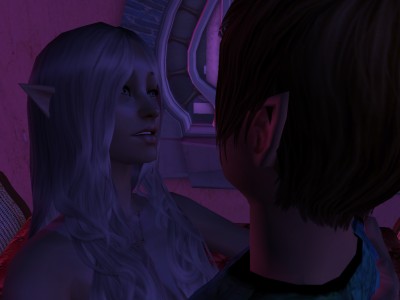
She passed her arms around his back and stepped closer to him.
She had always seemed to know how her clammy touch disturbed him, and all through the years she had rarely done more than touch his hands when she needed to teach him how to use them properly for some spell.
Lately she had been different. Lately she moved around him, stood close to him, touched him with her hands – his back, his shoulder, his hair. He had never been allowed to take his wife to him, but he knew what that meant.
He shuddered now – not with revulsion, but with hatred for her. Did she think that he would go gladly to her, since Iylaina could not be his? That beautiful, passionate, fiery creature she was?
“I would have wanted no other,” she murmured.
He twisted his hand into her white hair and pulled her head back and away from his.

“What do you want, Nimea?” he growled. “Why do you not take it? Surely you have a spell for that.”
“Surely you understand that if I may take whatever I want, there can only be delight in it for me if it is freely given?”
“Did my grandfather’s grandfather’s grandfather freely give it to you?”
“I did not want him.”
He pulled her close to him again, closer than before, and murmured into her hideous ear, “You only want me.”
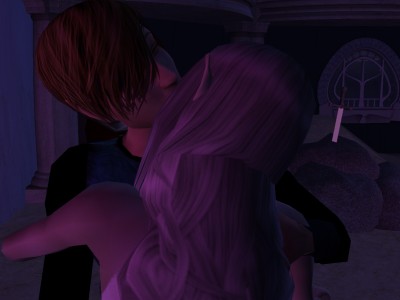
“You and no other,” she whispered.
There had been a kísór girl sleeping on the floor beside his bed for the last three months, and though she interested him no more than the furniture of his room, he had far more desire in his body for that wretched creature than he did for this goddess.
It was fire he wanted – he dreamt of building great pyres, of plunging his arms into the flames, of pressing his face into the embers, of hugging armfuls of burning logs against his body. She was as cold as frogs, as cold as fish, as cold as dark water, as cold as the bottom of her lake where sunlight never shone.
There was not the barest spark of fire in her, but he hated her, and that was fire enough for two.
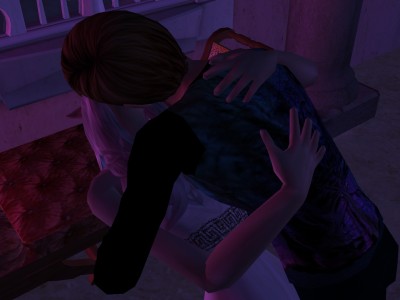








Wow this was somewhat surprising.